- Home
- Katherine Paterson
The Great Gilly Hopkins Page 3
The Great Gilly Hopkins Read online
Page 3
She tilted her head sassily and kept her eyes right on his.
“You’re at a new school now. You have a chance to—uh—make a new start. If you want to.”
So Hollywood Gardens had warned him, eh? Well, so what? The people here would have learned soon enough. Gilly would have made sure of that.
She smiled what she knew to be her most menacing smile.
“If there’s anyway I can help you—if you just feel like talking to somebody….”
Not one of those understanding adults. Deliver me! She smiled so hard it stretched the muscles around her eyes. “I’m OK,” she said. “I don’t need any help.”
“If you don’t want help, there’s no way I can make you accept it. But, Gilly”—he leaned forward in his chair and spoke very slowly and softly—“you’re not going to be permitted to hurt other people.”
She snuffled loudly. Cute. Very cute.
He leaned back; she thought she heard him sigh. “Not if I have anything to do with it.”
Gilly wiped her nose on the back of her hand. She saw the principal half reach for his box of tissues and then pull his hand back.
“You may go back to your class now.” She turned to go. “I hope you’ll give yourself—and us—a chance, Gilly.”
She ignored the remark. Nice, she thought, climbing the dark stairs. Only a half day and already the principal was yo-yoing. Give her a week, boy. A week and she’d have the whole cussed place in an uproar. But this afternoon, she’d cool it a little. Let them worry. Then tomorrow or maybe even the next day, Wham. She felt her old powers returning. She was no longer tired.
“SARSAPARILLA TO SORCERY”
She met Agnes Stokes the next day at recess. Agnes was a shriveled-up-looking little sixth grader from another class. She had long red hair that fell rather greasily to her waist, and when she sidled up to Gilly on the playground, the first thing Gilly noticed was how dirty her fingernails were.
“I know who you are,” the girl said. For a moment Gilly was reminded of the story of Rumpelstiltskin. Like that little creature, this girl had power over her. She knew who Gilly was, but Gilly didn’t know who she was.
“Yeah?” said Gilly to let the evil little dwarf know that she wasn’t interested.
“That was great about you beating up six boys yesterday.”
“Yeah?” Gilly couldn’t help but be a little interested.
“It’s all over the school.”
“So?”
“So.” The girl leaned against the building beside her, as though assuming Gilly would be pleased with her company.
“So?”
The girl twitched her freckled nose. “I thought me and you should get together.”
“How come?” Rumpelstiltskins were always after something.
“No reason.” The smaller girl had on a jacket the sleeves of which were so long that they came down to her knuckles. She began to roll up first her left sleeve and then her right. She did it slowly and silently, as though it were part of some ceremony. It gave Gilly the creeps.
“What’s your name?” Gilly blurted out the question, half expecting the girl to refuse to answer.
“Agnes Stokes”—she lowered her voice conspiratorily—“You can call me Ag.”
Big deal. She was glad when the bell rang, and she could leave Agnes Stokes behind. But when she left school that afternoon, Agnes slipped out from the corner of the building and fell in step with her.
“Wanta come over?” she asked. “My grandma won’t care.”
“Can’t.” Gilly had no intention of going into Agnes Stokes’s house until she found out what Agnes Stokes was up to. People like Agnes Stokes didn’t try to make friends without a reason.
She walked faster, but Agnes kept up with funny, little skip steps. When they got all the way up the hill to Trotter’s house, Agnes actually started up the walk after Gilly.
Gilly turned around fiercely. “You can’t come in today!”
“How come?”
“Because,” said Gilly. “I live with a terrible ogre that eats up little redheaded girls in one gulp.”
Agnes stepped back, with a startled look on her face. “Oh,” she said. Then she giggled nervously. “I get it. You’re teasing.”
“Arum golly goshee labooooooo!” screamed Gilly, bearing down on the smaller girl like a child-eating giant.
Agnes backed away. “Wha—?”
Good. She had succeeded in unsettling Rumpelstiltskin. “Maybe tomorrow,” said Gilly calmly and marched into the house without turning around.
“That you, William Ernest, honey?”
It made her want to puke the way Trotter carried on over that little weirdo.
Trotter came into the hall. “Oh, Gilly,” she said. “You got home so quick today I thought it was William Ernest.”
“Yeah.” Gilly started past her up the stairs.
“Wait a minute, honey. You got some mail.”
Mail! It could only be from—and it was. She snatched it out of Trotter’s puffy fingers and raced up the stairs, slamming the door and falling upon the bed in one motion. It was a postcard showing sunset on the ocean. Slowly she turned it over.
My dearest Galadriel,
The agency wrote me that you had moved.
I wish it were to here. I miss you.
All my love, Courtney
That was all. Gilly read it again. And then a third time. No. That was not all. Up on the address side, in the left-hand corner. The letters were squeezed together so you could hardly read them. An address. Her mother’s address.
She could go there. She could hitchhike across the country to California. She would knock on the door, and her mother would open it. And Courtney would throw her arms around her and kiss her all over her face and never let her go. “I wish it were to here. I miss you.” See, Courtney wanted her to come. “All my love.”
Inside her head, Gilly packed the brown suitcase and crept down the stairs. It was the middle of the night. Out into the darkness. No. She shivered a little. She would pick a time when Trotter was fussing over W.E. or Mr. Randolph. She’d steal some food. Maybe a little money. People picked up hitchhikers all the time. She’d get to California in a few days. Probably less than a week. People were always picking up hitchhikers. And beating them up. And killing them. And pitching their dead bodies into the woods. All because she didn’t have any money to buy a plane ticket or even a bus ticket.
Oh, why did it have to be so hard? Other kids could be with their mothers all the time. Dumb, stupid kids who didn’t even like their mothers much. While she—
She put her head down and began to cry. She didn’t mean to, but it was so unfair. She hadn’t even seen her mother since she was three years old. Her beautiful mother who missed her so much and sent her all her love.
“You all right, honey?” Tap, tap, tap. “You all right?”
Gilly sat up straight. Couldn’t anyone have any privacy around this dump? She stuffed the postcard under her pillow and then smoothed the covers that she’d refused to straighten before school. She stood up at the end of the bed like a soldier on inspection. But the door didn’t open.
“Anything I can do for you, honey?”
Yeah. Fry yourself, lard face.
“Can I come in?”
“No!” shrieked Gilly, then snatched open the door.
“Can’t you leave me alone for one stupid minute?”
Trotter’s eyelids flapped on her face like shutters on a vacant house. “You OK, honey?” she repeated.
“I will be soon as you get your fat self outta here!”
“OK.” Trotter backed up slowly toward the stairs. “Call me, if you want anything.” As an afterthought, she said, “It ain’t a shameful thing to need help, you know.”
“I don’t need any help”—Gilly slammed the door, then yanked it open—“from anybody!” She slammed it shut once more.
“I miss you. All my love.” I don’t need help from anybody except from you. If I wr
ote you—if I asked, would you come and get me? You’re the only one in the world I need. I’d be good for you. You’d see. I’d change into a whole new person. I’d turn from gruesome Gilly into gorgeous, gracious, good, glorious Galadriel. And grateful. Oh, Courtney—oh, Mother, I’d be so grateful.
“Lord, you are so good to us.” Mr. Randolph was saying the supper blessing. “Yes, Lord, so very good. We have this wonderful food to eat and wonderful friends to enjoy it with. Now, bless us, Lord, and make us truly, truly grateful. Ah-men.”
“Ay-men. My, Mr. Randolph, you do ask a proper blessing.”
“Oh, Mrs. Trotter, when I sit before the spread of your table, I got so much to be thankful for.”
Good lord, how was a person supposed to eat through this garbage?
“Well, Miss Gilly, how was school for you today?”
Gilly grunted. Trotter gave her a sharp look. “It was OK, I guess.”
“My, you young people have such a wonderful opportunity today. Back when I was going to school—oh, thank you, Mrs. Trotter—what a delicious-smelling plate. My, my…”
To Gilly’s relief, the blind man’s attention was diverted from his tale of childhood schooldays to the organization of the food on his plate and the eating of it, which he did with a constant murmuring of delight, dropping little bits from his mouth to his chin or tie.
Disgusting. Gilly switched her attention to William Ernest, who, as usual, was staring at her bug-eyed. She smiled primly and mouthed, “How do you do, sweetums?”
Sweetums immediately choked on a carrot. He coughed until tears came.
“What’s the matter, William Ernest, honey?”
“I think”—Gilly smiled her old lady principal smile—“the dear child is choking. It must be something he ate.”
“Are you all right, baby?” asked Trotter.
W.E. nodded through his tears.
“Sure?”
“Maybe he needs a pat on the back,” Mr. Randolph offered.
“Yeah!” said Gilly. “How about it, W.E., old man? Want me to swat you one?”
“No! Don’t let her hit me.”
“Nobody’s gonna hit you, honey. Everybody just wants to help.” Trotter looked hard at Gilly. “Right, Gilly?”
“Just want to help, little buddy.” Gilly flashed her crooked-politician smile.
“I’m all right,” the boy said in a small strangled voice. He slid his chair a couple of inches toward Trotter’s end of the table, so that he was no longer directly across from Gilly.
“Say, W.E.”—Gilly flashed her teeth at him—“how about you and me doing a little red-hot reading after supper? You know, squeeze the old orange reader?”
W.E. shook his head, his eyes pleading with Trotter to save him.
“My, oh, my, Mrs. Trotter. I can tell how old I am when I can’t even understand the language of the young people about me,” said Mr. Randolph.
Trotter was looking first at W.E. and then at Gilly. “Don’t you fret yourself, Mr. Randolph.” She leaned across the corner of the table and patted William Ernest gently, keeping her eyes on Gilly. “Don’t you fret, now. Some times these kids’ll tease the buttons off a teddy bear. Ain’t nothing to do with age.”
“Hell, I was just trying to help the kid,” muttered Gilly.
“He don’t always know that,” Trotter said, but her eyes were saying “like heck you were.” “I got a real good idea,” she went on. “They tell me, Gilly, that you are some kind of a great reader yourself. I know Mr. Randolph would like to hear you read something.”
The little wrinkled face brightened. “My, my! Would you do that, Miss Gilly? It would be such a pleasure to me.”
Trotter, you rat. “I don’t have anything to read,” Gilly said.
“OK, that ain’t a problem. Mr. Randolph’s got enough books to start a public library, haven’t you, Mr. Randolph?”
“Well, I do have a few,” he chuckled. “Course you’ve got the Good Book right here.”
“What good book?” demanded Gilly, interested in spite of herself. She did like a good book.
“I believe Mr. Randolph is referring to the Holy Bible.”
“The Bible?” Gilly didn’t know whether to laugh or cry. She had a vision of herself trapped forever in the dusty brown parlor reading the Bible to Trotter and Mr. Randolph. She would read on and on forever, while the two of them nodded piously at each other. She jumped up from her chair. “I’ll get a book,” she said. “I’ll run over to Mr. Randolph’s and choose something.”
She was afraid they would try to stop her, force her to read the Bible, but they both seemed pleased and let her go.
Mr. Randolph’s front door was unlocked. The house was pitch-black and mustier than Trotter’s. Quickly, Gilly pushed a light switch. Nothing happened. Of course. Why should Mr. Randolph care if a bulb burned out? She stumbled from the hall to where she thought the living room should be, fumbling along the wall with her fingers until she found another switch. To her relief this one worked—only 40 watts worth, maybe—but still there was light.
Leaning against two walls of the crowded little room were huge antique bookcases that reached the ceiling. And stacked or lying upside down, even put in backward, were books—hundreds of them. They looked old and thick with dust. It was hard to think of funny little Mr. Randolph actually reading them. She wondered how long he had been blind. She wished she could push her mind past those blank white eyes into whatever of Mr. Randolph all these books must represent.
She went toward the larger shelf to the right of the door, but she felt strangely shy about actually touching the books. It was almost as though she were meddling in another person’s brain. Wait. Maybe they were all for show. Maybe Mr. Randolph collected books, trying to act like some big-shot genius, even though he himself couldn’t read a word. No one would ever catch on. They’d think he didn’t read because he couldn’t see. That was it, of course. She felt better. Now she was free to look at the books themselves.
Without thinking, she began to straighten out the shelves as she read the titles. She saw several volumes of an encyclopedia set: “Antarctica to Balfe,” then “Jerez to Liberty.” She looked around for other volumes. It bothered her to have everything in a muddle. High on the top shelf was “Sar saparilla to Sorcery.” She dragged a heavy stuffed chair backward to the shelf and climbed up on the very top of its back. On tiptoe, leaning against the rickety lower shelves to keep from toppling, she could barely reach the book. She pulled at it with the tip of her fingers, catching it as it fell. Something fluttered to the floor as she did so.
Money. She half fell, half jumped off the chair, and snatched it up. Two five-dollar bills had fallen out from behind “Sarsaparilla to Sorcery.” She put the encyclopedia down and studied the old, wrinkled bills. Just when she was needing money so badly. Here they’d come floating down. Like magic. Ten dollars wouldn’t get her very far, but there might be more where these came from. She climbed up again, stretching almost to the point of falling, but it was no good. Although she could just about reach the top shelf with her fingertips, she was very unsteady, and the lower shelves were much too wobbly to risk climbing.
Heavy footsteps thudded across the front porch. The front door opened. “You all right, Gilly, honey?”
Gilly nearly tripped over herself, leaping down and grabbing up “Sarsaparilla to Sorcery” from the chair seat, stretching her guts out to tip the book into its place on the shelf. And just in time. She got down on the chair seat, as Trotter appeared at the door.
“You was taking so long,” she said. “Then Mr. Randolph remembered that maybe the bulbs was all burned out. He tends to forget since they really don’t help him much.”
“There’s a light here,” Gilly snapped. “If there hadn’t been, I’d have come back. I’m not retarded.”
“I believe you mentioned that before,” said Trotter dryly. “Well, you find anything you wanted to read to Mr. Randolph?”
“It’s a bunch of junk.”
“One man’s trash is another man’s treasure,” Trotter said in a maddeningly calm voice, wandering over to a lower shelf as she did so. She pulled out a squat leather-bound volume and blew the dust off the top. “He’s got a yen for poetry, Mr. Randolph does.” She handed the book up to Gilly, who was still perched on the chair. “This is one I used to try to read to him last year, but”—her voice sounded almost shy—“I ain’t too hot a reader myself, as you can probably guess.”
Gilly stepped down. She was still angry with Trotter for bursting in on her, but she was curious to know just what sort of poetry old man Randolph fancied. The Oxford Book of English Verse. She flipped it open, but it was too dark to see the words properly.
“Ready to come along?”
“Yeah, yeah,” she replied impatiently. Holding her neck straight to keep from looking up at “Sarsaparilla,” she followed Trotter’s bulk back to her house.
“What did you bring?” Mr. Randolph’s face looked like a child’s before a wrapped-up present. He was sitting right at the edge of the big brown chair.
“The Oxford Book of English Verse,” Gilly mumbled.
He cocked his head. “I beg your pardon?”
“The poems we was reading last year, Mr. Randolph.” Trotter had raised her voice as she always did speaking to the old man.
“Oh, good, good,” he said, sliding back into the chair until his short legs no longer touched the worn rug.
Gilly opened the book. She flipped through the junk at the beginning and came to the first poem. “Cuckoo Song,” she read the title loudly. It was rather pleasant being able to do something well that none of the rest of them could. Then she glanced at the body of the poem.
Sumer is icumen in,
Lhude sing cuccu!
Groweth sed, and bloweth med,
And springth the wude nu—
Sing cuccu!
Cuckoo was right. “Wait a minute,” she muttered, turning the page.
Bytuene Mershe ant Averil…
She looked quickly at the next.

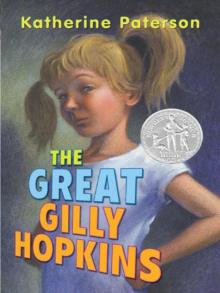 The Great Gilly Hopkins
The Great Gilly Hopkins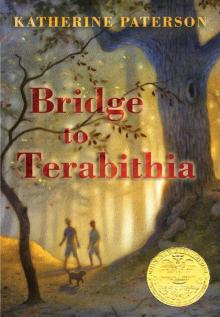 Bridge to Terabithia
Bridge to Terabithia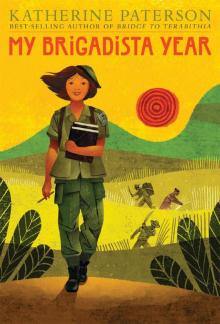 My Brigadista Year
My Brigadista Year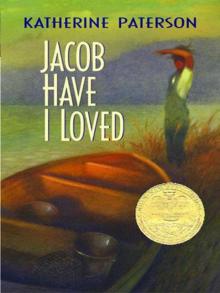 Jacob Have I Loved
Jacob Have I Loved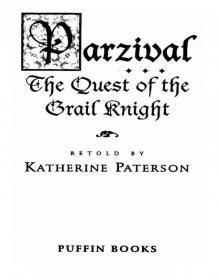 Parzival: The Quest of the Grail Knight
Parzival: The Quest of the Grail Knight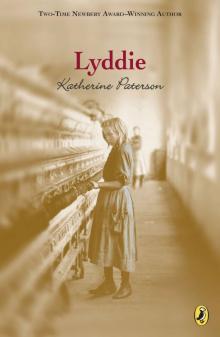 Lyddie
Lyddie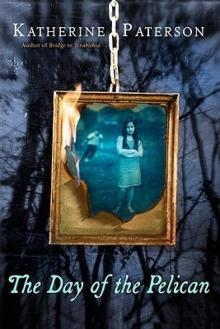 The Day of the Pelican
The Day of the Pelican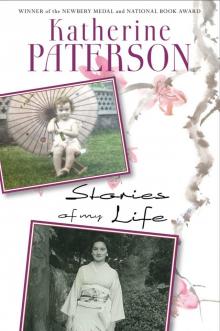 Stories of My Life
Stories of My Life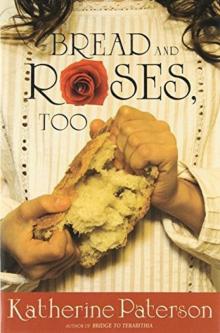 Bread and Roses, Too
Bread and Roses, Too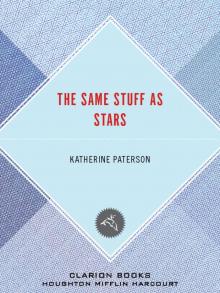 The Same Stuff as Stars
The Same Stuff as Stars